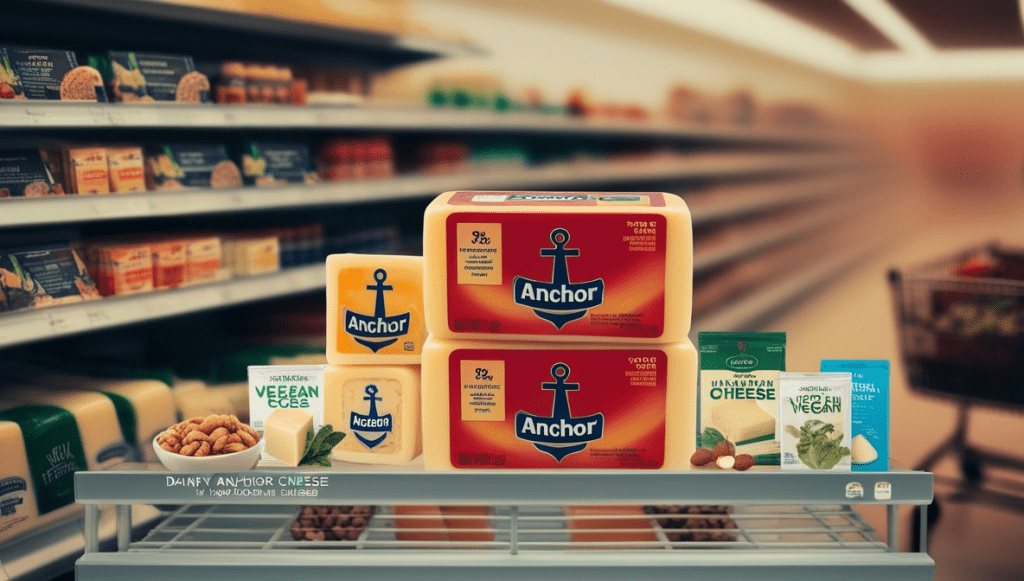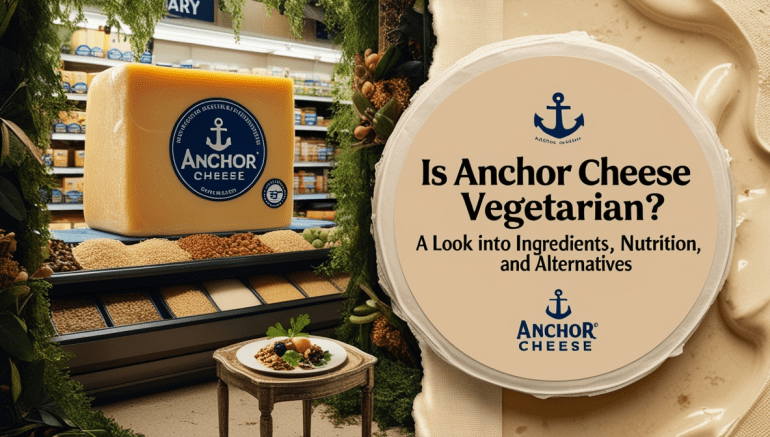Anchor Cheese, produced by the global dairy brand Anchor, is known for its high-quality dairy products, including a range of cheese varieties loved worldwide. However, for those following a vegetarian diet, a crucial question arises: Is Anchor cheese vegetarian? This article will explore Anchor cheese ingredients, vegetarian considerations, nutritional information, and alternative cheese options that suit a vegetarian diet.
1. What is Anchor Cheese?
Anchor Cheese is a line of dairy cheeses made by the Anchor brand, originally from New Zealand and widely distributed globally. Anchor offers a variety of cheeses, including cheddar, mozzarella, and specialty cheeses, each with its unique flavors and textures. These cheeses are popular for cooking, snacking, and meal preparation, but not all Anchor cheeses may be suitable for vegetarians.
2. Is Anchor Cheese Vegetarian?
Whether or not Anchor Cheese is vegetarian depends on the specific product and the type of rennet used in production. Rennet is an enzyme necessary for coagulating milk during the cheesemaking process, but it can come from either animal or non-animal sources:
- Animal Rennet: This traditional rennet is sourced from the stomach lining of young calves, making it unsuitable for vegetarians.
- Vegetarian Rennet: Vegetarian-friendly rennet can be microbial (derived from fungi or bacteria) or plant-based, making it an ideal option for those following a vegetarian diet.
Does Anchor Use Animal or Vegetarian Rennet?
The type of rennet used in Anchor Cheese varies by product and region. Some of Anchor’s cheese products use microbial or vegetarian-friendly rennet, while others may still use animal rennet. To confirm the type of rennet used, it’s recommended to check the specific product’s packaging or contact Anchor directly, as ingredient sourcing can vary between countries.
3. Popular Anchor Cheese Products and Their Suitability for Vegetarians
While exact formulations may vary, here is an overview of some popular Anchor Cheese products and their general suitability:
- Anchor Cheddar Cheese: Cheddar cheese may or may not be vegetarian, depending on the rennet source. Microbial or vegetarian rennet makes it suitable for vegetarians, so it’s best to check the package.
- Anchor Mozzarella Cheese: Mozzarella varieties often contain animal rennet, but some types may use vegetarian-friendly alternatives.
- Anchor Tasty Cheese: Tasty cheeses, similar to cheddar, may use either type of rennet.
To be sure, look for packaging that mentions “vegetarian rennet” or “microbial rennet.” Alternatively, you can reach out to Anchor’s customer service to inquire about specific products.
4. Nutritional Profile of Anchor Cheese
Anchor Cheese products generally offer a good source of protein, calcium, and essential nutrients. Here’s a typical nutritional breakdown for a standard serving (about 1 ounce or 28 grams) of cheddar cheese, one of Anchor’s most popular types:
| Nutrient | Amount per 1 oz (28 g) |
|---|---|
| Calories | 110 kcal |
| Protein | 7 g |
| Total Fat | 9 g |
| Saturated Fat | 5 g |
| Cholesterol | 30 mg |
| Sodium | 180 mg |
| Calcium | 200 mg |
Cheese is generally calorie-dense, making it a good source of protein and fat. However, due to the high saturated fat and sodium levels, it’s best to consume in moderation, especially for those with dietary restrictions.

5. Health Benefits of Anchor Cheese
Anchor Cheese can provide several health benefits when eaten as part of a balanced diet:
- High-Quality Protein: Cheese contains complete protein, providing essential amino acids necessary for muscle growth, repair, and overall health.
- Rich in Calcium: Calcium is vital for bone health, and cheese provides a significant amount in a small serving.
- Source of Vitamins: Cheese, especially cheddar, is a good source of vitamins like B12, essential for nerve function and red blood cell formation.
6. Vegetarian-Friendly Cheese Alternatives
If Anchor Cheese doesn’t align with your vegetarian diet, several brands and cheese alternatives specifically cater to vegetarians:
- Daiya Cheese: This plant-based cheese brand offers a wide range of vegan options that mimic the texture and taste of traditional cheese.
- Violife: Another popular vegan cheese brand, Violife offers a variety of flavors, from cheddar-style to mozzarella-style, all made without animal-derived ingredients.
- Follow Your Heart: Known for its rich, creamy taste, this brand produces a range of plant-based cheeses suitable for vegetarians.
7. Caloric Comparison of Anchor Cheese with Other Cheeses
For those managing calorie intake, here’s how Anchor cheese’s caloric content compares with other popular cheeses (per 1 oz or 28 g):
| Cheese Type | Calories per 1 oz |
|---|---|
| Anchor Cheddar | 110 kcal |
| Mozzarella Cheese | 85 kcal |
| Swiss Cheese | 108 kcal |
| Gouda Cheese | 110 kcal |
| Vegan Cheese | 70-90 kcal |
8. Is Anchor Cheese Keto-Friendly?
Yes, Anchor cheese is generally keto-friendly due to its low carbohydrate content and high fat and protein levels. Cheddar and mozzarella, in particular, are popular keto choices, allowing cheese lovers to add flavor without impacting carbohydrate counts significantly.
9. Anchor Cheese in a Vegetarian Diet
For vegetarians who consume dairy but avoid animal rennet, checking the rennet type is key. Opting for cheeses labeled with “vegetarian rennet” ensures alignment with dietary preferences. If a particular Anchor cheese doesn’t meet your needs, there are many alternatives to explore within the vegetarian cheese market.
Conclusion
Anchor Cheese is a globally recognized brand offering a variety of cheese options, but not all of its products are vegetarian-friendly due to the type of rennet used. Vegetarians looking for dairy cheese should seek out products that specify “vegetarian rennet” or explore vegetarian-friendly brands and plant-based cheese alternatives. Anchor cheese offers essential nutrients, including protein, calcium, and vitamins, making it a nutritious choice for those who consume dairy. By understanding your dietary needs and exploring alternatives, you can find the best cheese options that meet your preferences.


